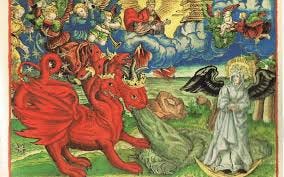Why wait?
Christians have made much of the "second coming of Christ" over the millennia. We read Sunday from John's Revelation (please note the singular—John had a revelation, not revelations), a book reinterpreted over and over as a prediction of Christ's return to usher in the full realization of the Kingdom of God.
In college, I took a course on apocalyptic literature with my advisor, Alexandra Brown, and loved it. The genre produces the juiciest theology thanks to its fantastic beasts, cataclysmic events, wild creatures (including the humans), and ultimate triumph of good over evil, but after evil seems to have won out. No wonder Hollywood grabs ahold of apocalyptic narratives to portray them on the big screen. Apocalyptic writers create gripping stories capable of enthralling, terrifying, and inspiring.
One of our larger projects challenged us to read The Late Great Planet Earth by Hal Lindsey and Carla C. Carlson. Lindsey takes most of the credit because he successfully spun their interpretation of Revelation into a career of doomsday prophesying. We watched a movie based on the book, and I marveled at the maneuvering required to reinterpret a text from 2000 years ago and morph it into a prophetic text for the 20th century. The authors turn John's images from mythological creatures into nuclear mushroom clouds and military helicopters.
Lindsey and Carlson's book arrived on the scene in the 1970s and laid the groundwork for the popularity of the Left Behind series in the late 1990s and early 2000s. Those books gained a tremendous following, allowing the authors to continue their story of the eschaton (end times) over sixteen novels and five movies. It's safe to say that people love a good bedtime story about the end of the world.
It's nothing new. Hal Lindsey didn't invent the concept of reinterpreting Revelation for a current context. Do a quick search of "premillennialism" and "dispensationalism," and you'll find the concepts reach back into the 13th century. There's something in our human nature that cannot resist the idea of the divine bringing a horrible event upon the earth to punish the sinfulness of humanity, but only after a rapture in which God saves the right sorts of people to spare them from the time of tribulation. Honestly, couched in those terms, we can look back to Genesis and the story of Noah and his arc. Then again, didn't God promise Noah never to cause such an event to befall the earth?
Safe to say, eschatology (the study of end-time prophecy) makes for a riveting study, and I easily can take us down that rabbit hole. The more you uncover, the more you find lying beneath for further excavation. Which, as it happens to be, is the true meaning of the word "Apocalyptic."
Apocalyptic is not the same thing as eschaton or Armageddon.
Keep reading with a 7-day free trial
Subscribe to Mary Hemmer, Prayerful Kitchen to keep reading this post and get 7 days of free access to the full post archives.




